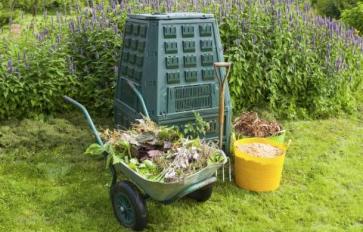
To reduce your garden’s carbon footprint, try organic pesticides… Be safe, be sure!
Organic gardening as a concept is not new. Before the advent of synthesized fertilizers and pesticides, the farmers and growers of any community relied on nothing but things already available in nature to curb harmful pest and weed growth, as well as to provide a plant feed. Being part of the organic movement means that you reduce your garden’s carbon footprint and also keep synthesized and harmful chemicals away from the very soil that produces food for your table. So let’s talk about organic pest removal, eradication as well as pesticides. While some of these may still be synthesized chemicals, their effect on the soil and Mother Nature is far lesser than the harmful OTC pesticides we so lovingly pour down her throat!
Basic Pesticide Guidelines
- Before you choose to spray your garden with pesticide, be it organic or not, identify the bug that you are after. You have to know which pest needs to be eradicated from your garden – the correct pesticide will ensure minimal usage as well as correct usage.
- Use a targeted pesticide –one that specifically targets the pest that needs to be eradicated. Broad spectrum pesticides also tend to kill plant-friendly bugs like bees and butterflies.
- When in doubt, choose the least toxic alternative. Instead of words like DANGER, TOXIC, KEEP AWAY FROM CHILDREN & PETS, try to get pesticides with labels like organic, safe, not harmful to humans or pets…
- Spray your pesticide before the sun comes up or after the sun goes down to avoid harming the birds, bees and butterflies.
- Do not apply any pesticide just before a rain or a storm as the pesticide will then run off and pollute and poison the underground water supply.
Organic Pesticides, OTC
If you have to use a store-bought pesticide, try going with these safer, naturally derived alternatives.
- Pyrethrin: If you’ve read our marigold article, then you would know that the plants of the chrysanthemum family have this naturally occurring chemical which, along with its synthetic substitute pyrethroid, is highly effective against a wide range of insects.
- Lime Sulfur: An old-timer in pesticides, and available both in powder or solution form, lime sulfur is applied to plants when they are dormant. It kills mites, mite eggs as well as many other insects and fungi off ornamental and fruiting plants.
- Sabadilla: The seeds of a lily found in South America, sabadilla is used to eradicate stink and squash bugs.
- Ryania: Made from yet another South American plant, from the stems and roots – ryania controls stem borers and other worms.
- Snuff: What was once used by royalty to induce sneezing can also eradicate tiny flies and worms from house plants. Remember not to use any tobacco-based pesticide on tomatoes, eggplants and peppers as it can spread tobacco virus to them.
- Diatomaceous Earth: Plagued with snails and slugs? Diatomaceous earth, when used as mulch, makes these crawlers shy away from your garden. The reason? It’s sharp for their rather delicate skin.
- Oil and Sulfur Sprays: Organic petroleum oils and derivatives have a proven track record of vanquishing irritating bugs when it comes to hard and woody plants. Leaf rollers, aphids, mite eggs as well as scale insects and adult mites all respond to these sprays.
- Talcum Powder: Commonplace and not particularly a horticulture tool, a light dusting of talcum powder on plants is very effective against flea beetles and corn earworms.
Organic Pesticides, DIY
And then there are the ones we can make at home with common everyday items.
- Liquid Dishwashing Soap: So very commonplace. Dishwashing liquid. And yet it’s a very effective pest killer! How? Gently mix in a teaspoon of liquid dishwashing soap in a cup of edible vegetable oil. Shake vigorously to emulsify and then add this to a quart or a liter of water. Spray onto plants at 10-day intervals as an all-purpose spray. It targets white flies, spider mites, aphids as well as various insects on carrots, celery, cucumbers, eggplants, peppers, and much more.
- Garlic & Onions: Grind equal amounts of raw onions and garlic into a puree. Mix a cup of puree in 5 liters of warm water and soak overnight. Strain in the morning and spray the liquid on roses, fruit trees, and flowers to kills aphids and apple borers.
- Tomato Leaves: Tomato leaves contain a chemical called solanine that is an effective pesticide. Simply soak leaves in a bucket of water for 2-3 days, and keep in the sun. Strain and use as an effective spray on plants. Remember that tomato leaves are poisonous so use this spray when plants are dormant.
- Tobacco Water: Tobacco is an effective soil pesticide, but not to be used on fruit or vegetable bearing plants. Douse butts in water till the color of the water of brown tea; and then pour on the soil. The solution kills fungus gnats, symphylids, centipedes, root lice, and other underground pests—but remember that it could kill you too!
- Hot Pepper: To discourage cats, dogs, many insect pests, and snails from munching on leaves, dust powdered hot pepper or a spray of hot pepper sauce on plants.
- Garlic and Red-Pepper Spray: Grind up a large bulb of garlic (or a large onion) and add in a tablespoon of ground cayenne pepper as well as one liter of water. Steep for an hour. Strain this liquid into a sprayer and spray on any plant plagued by chewing or sucking insects.
Other than a pesticide, what else might work?
Think pests can only be killed off by pesticides? Wrong -- here are some healthy alternatives…
- Culture Control: Use the right pruning, fertilizing and watering regime, as well as making sure to select pest-resistant varieties or species over weaker pest-prone plants.
- Physical Control: Using mulches to keep weeds from growing, or solarization for soil borne pathogens or weed seeds.
- Mechanical Control: Things like regular weeding or even something as simple as spraying leaves forcefully with water to wash the pests off the plants.
- Biological Control: Introducing beneficial organisms such as various insects that eat harmful garden pests.
- Replanting: In extreme cases, where a plant or even a tree regularly requires pesticide treatment, one can consider replanting with a more pest-resistant species or variety.
We hope this article helps you turn into a more organically inclined grower. Small steps, but that’s all that is needed to turn our skewed ecological balance into a more favorable one. Please do write in with your thoughts in the comments section below.
Till then, happy gardening!








